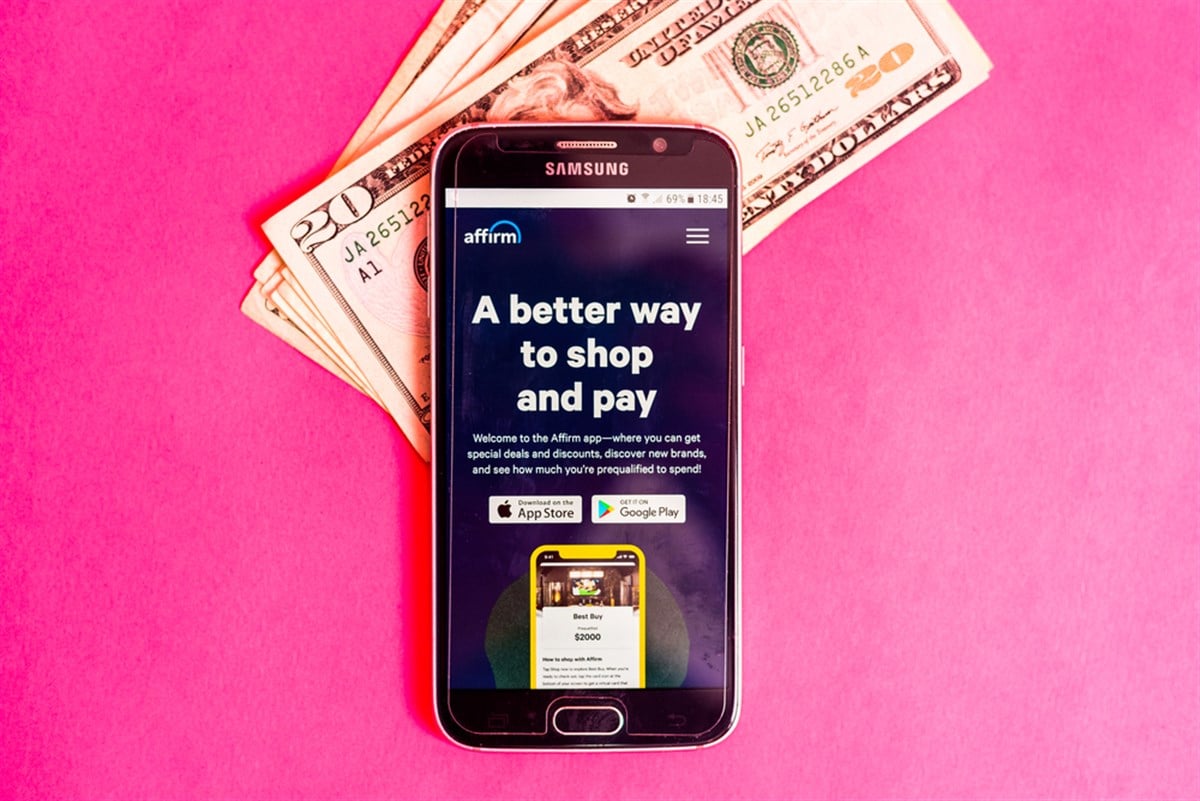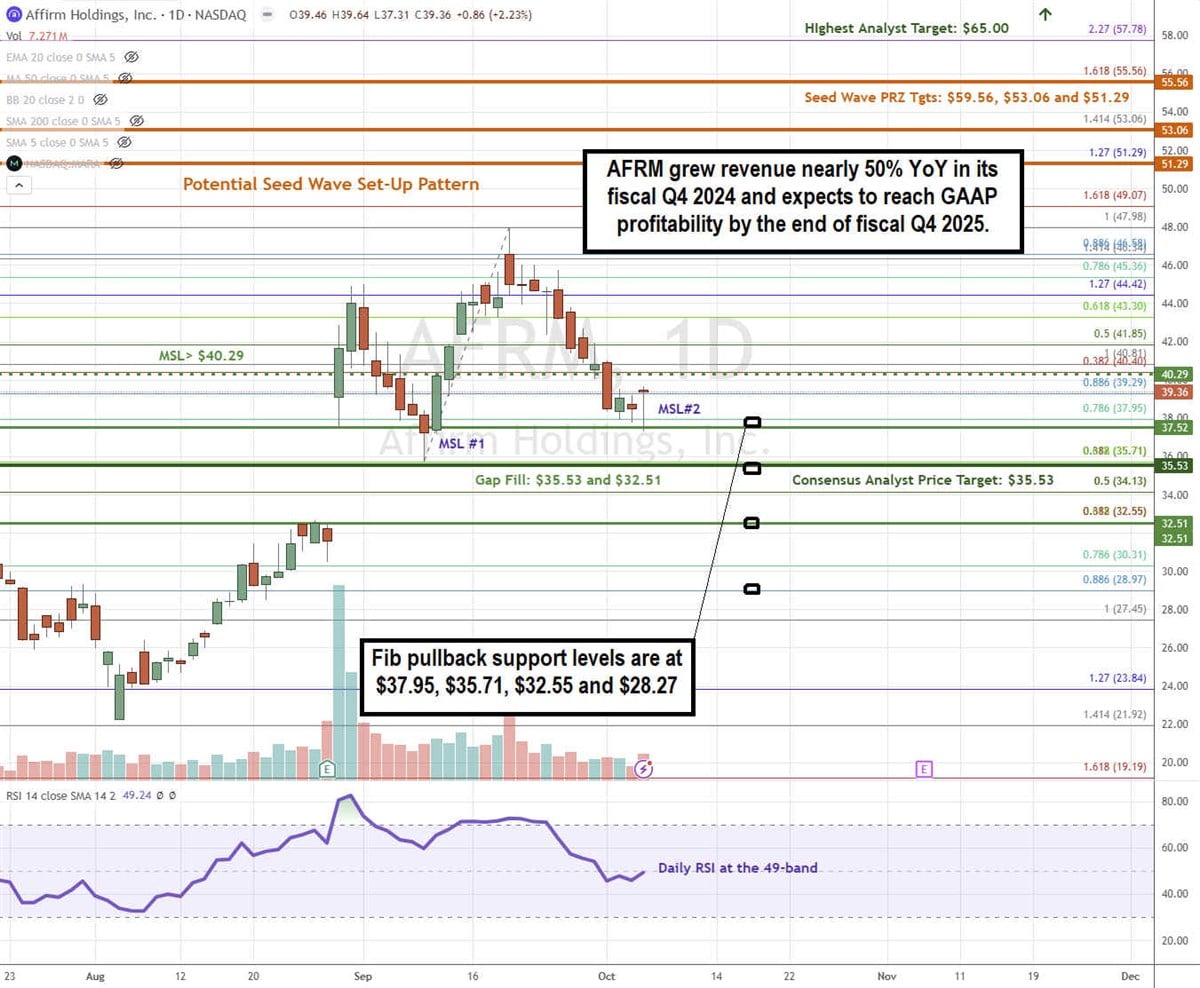
Affirm Holdings Inc. (NASDAQ: AFRM) is a fintech offering buy-now-pay-later (BNPL) options for consumers to finance their purchases, enabling merchants to generate additional sales that otherwise may not have been made. The transactions are a win-win for consumers and the merchants, while Affirm is the middleman facilitating the financing. The company is growing and working its way towards profitability. The interest rate cut cycle can further accelerate its path to profitability as the busiest time of the year approaches, the holiday shopping season.
Affirm operates in the business services sector, competing with BNPL providers like Afterpay, owned by Block Inc. (NYSE: SQ), PayPal Holdings Inc. (NASDAQ: PYPL), and Sezzle Inc. (NASDAQ: SEZL). Affirm is a pioneer in the BNPL industry founded by PayPal co-founder Max Levchin.
How Interest Rate Cuts Impact Affirm
The U.S. Federal Reserve (Fed) has started its interest rate cut cycle with a 50 bps cut, with more expected on the way. This makes borrowing costs cheaper. Affirm benefits directly as it reduces its cost of capital, improving its profit margins and enabling it to offer more competitive interest rates. Interest rate cuts also stimulate consumer spending, leading to more transactions for Affirm with higher loan volumes.
However, on the flip side, it will also reduce interest income as Affirm passes on the lower interest rate to consumers, thereby reducing revenues. Affirm wouldn't be the only BNPL company benefitting as its competitors are in the same boat, which will continue to put more pressure on the company's market share and pricing.
Affirm Uses AI to Improve Efficiencies
Affirm has been using artificial intelligence (AI) algorithms to bolster its operations. Its AI algorithms are used in a data-driven approach to assessing risk and creditworthiness for every transaction to determine the financing options for qualified consumers. It also provides financing for customers who may not qualify for traditional credit cards. AI is also used to detect and prevent fraud. AI helps to provide personalized offers and financing recommendations for consumers to improve their shopping experience. Workflows and processes are automated with the help of AI.
Affirm’s Popularity and Partnerships Grow
The service is notably most popular with millennials and Gen-Z-ers as they opt to avoid conventional credit cards. Incidentally, Affirm now offers its Affirm debit card through Visa Inc. (NYSE: V), which enables its users to use Affirm for in-store purchases. It's also available to Apple Inc. (NASDAQ: AAPL) Apple Pay users in the United States to pay over time for eligible purchases with the option to pay in bi-weekly or monthly installments at 0%. Affirm is a BNPL option for customers of Target Co. (NYSE: TGT), Walmart Inc. (NYSE: WMT), and Amazon.com Inc. (NASDAQ: AMZN). Affirm has grown its merchant network to over 300,000.
Affirm is Still in Its Hypergrowth Stage
Affirm reported a fiscal Q4 2024 EPS loss of 14 cents, which was 34 cents better than consensus estimates for a loss of 48 cents. Revenues surged 48% YoY to $659.2 million, crushing the $604 million consensus analyst estimate. Gross merchandise volume rose 31% YoY to $7.2 billion, significantly outpacing overall e-commerce growth. Transaction volume in the Affirm network rose 42% YoY to 24,7 million and 15% QoQ.
Affirm Raises Guidance for Fiscal Q1 2025
The company raised its fiscal first quarter 2025 revenue guidance to $640 million to $670 million, crushing consensus estimates of $625.04 million. GMV is expected between $7.1 million and $7.4 million. Adjusted operating margin is expected between 14% and 16%.
The company raised forecast operating income profitability on a GAAP basis by fiscal Q4 2025, a year from now. Their goal is to operate on the path to profitability with a fiscal 2025 GMV of more than $33.5 billion, revenue 10 bps or higher, and an adjusted operating margin greater than 18.4%.
CEO Levchin stated in its shareholder letter, “We made great progress in FY’24. The opportunities ahead of us are significant, and we are excited to take full advantage of them. Scaling the Affirm Card, amplifying engagement with personalized incentives, rolling out new integrations, going live in the UK, and doing it all while achieving GAAP profitability is our plan for FY’25, and we are off to a fine start.”
AFRM Sets Up a Potential Seed Wave Breakout
A seed wave is a rare pattern comprised of two consecutive higher market structure low (MSL) triggers. Based on fib extensions of 1.27, 1.414, and 1.618, the seed wave sets the upside potential reversal zones (PRZs) as targets.

AFRM triggered a price gap on its solid fiscal Q4 2024 earnings report to $37.52. The first MSL formed at $35.52 and triggered above $40.29. The second MSL formed around the $37.52 gap fill with a trigger near the first MSL trigger. This foreshadows upside PRZ targets at $51.29, %53.06 and $55.56. The relative strength index (RSI) is attempting to bounce back up through the 50-band. Fibonacci (Fib) pullback support levels are at $37.95, $35.71, $32.55, and $28.27.
Affirm’s average consensus price target is $35.53, and its highest analyst price target is $65.00. Analysts have given the stock seven Buy ratings, nine Hold ratings, and five Sell ratings. The stock has an 8.39% short interest.
Actionable Options Strategies: Bullish investors can buy AFRM stock on pullbacks using cash-secured puts at the Fib pullback support levels to buy the dip.
By implementing a bullish call debit spread, bullish options investors can limit the maximum downside and profit from modest upside gains for less capital than owning the stock.